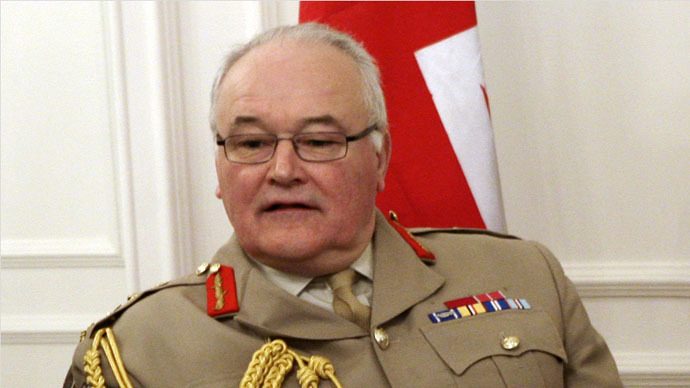UK lost ‘national appetite’ for war, says top general

Britain is suffering from “campaign fatigue” following its experience in Iraq and Afghanistan, compounded by a belief in government that defense is not a vote-winner, according to the former head of the British Army.
General Sir Peter Wall served as chief of the general staff from 2010 to 2014.
Writing in the Telegraph newspaper, Wall warned that despite spending a hard decade in Iraq and Afghanistan, Britain should not expect an easier future. He said the UK should be wary of being “caught napping.”
Adding his voice to those who have made a priority of opposing defense cuts recently, Wall sketched the dangers faced by Britain in the wake of the Arab Spring and the “State-on-state confrontation in Europe initiated by Russia.”
READ MORE: Battle lines: Defense spending cuts could break the Tories
“The key lessons here are threefold, and they are not new. First, we are very poor at predicting the future. Second, there are plenty of potential threats out there. Third, we need balanced forces to ensure we can protect the UK, its people, and our interests against the unforeseen,” said Wall.
“Our national appetite for military intervention has been diminished by the experiences of Iraq and Afghanistan. There is a sense of campaign fatigue, which is reflected in low political appetite for the UK to engage to protect our longer-term interests. This is compounded by a belief that there are no votes in defense.”
Wall pointed to the rapidly shifting character of international politics and offered “…a word of caution. Just because we have had a tough decade it doesn’t mean the future will be kind to us. When it isn’t, public opinion can turn on a sixpence; not so defense capability after a period of under-investment.”
The general was writing on the risks posed by deep cuts to the military. His comments come in a week when Prime Minister David Cameron faces a Tory rebellion on the issue.
Reductions will be debated on Thursday. A number of politicians and officers have lambasted the PM over his waning commitment to spend the symbolic 2 percent of GDP on defense as part of NATO.
Ex-Colonel Bob Stewart MP, who sits on the Defense Select Committee, last week called for defense chiefs to resign over the reductions and indicated he may step down from the committee over the issue.
On Monday, a top UK defense think tank released a report arguing the government believes strategic threats posed to Britain are simply not serious enough to merit insulating military spending from budget cuts.
READ MORE: Govt deems security risks too low to ‘exempt defense from austerity,’ says think tank
The paper by the Royal United Services Institute (RUSI) centers on the economics of defense under austerity.
The study’s findings jar with other statements, made in a similar vein to those of Wall, by politicians and other leading generals on the dangers faced by the UK.
In February, the top British officer in NATO – General Sir Adrian Bradshaw – referred to Russia as an “obvious existential threat to our whole being,” while David Cameron has called the rise of Islamic State a “mortal threat.”
However their comments appear to be at odds with the RUSI report, which concludes: “The government is not yet convinced that strategic security risks are high enough to justify an exemption for defense from austerity.”












